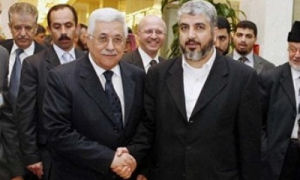 Following the expiration of the 26 January deadline set by the International Quartet for the resumption of peace negotiations– as interpreted by the Palestinian leadership – the Palestinians have declared that the talks between senior Israeli and Palestinian negotiators, Itzhak Molcho and Saeb Erekat, had failed and future steps were now under consideration in Ramallah. Palestinian President Mahmoud Abbas is not in a hurry to make any decisions regarding the future actions of the Palestine Liberation Organization (PLO).
Following the expiration of the 26 January deadline set by the International Quartet for the resumption of peace negotiations– as interpreted by the Palestinian leadership – the Palestinians have declared that the talks between senior Israeli and Palestinian negotiators, Itzhak Molcho and Saeb Erekat, had failed and future steps were now under consideration in Ramallah. Palestinian President Mahmoud Abbas is not in a hurry to make any decisions regarding the future actions of the Palestine Liberation Organization (PLO).
The PLO’s inventory of possible measures is varied but not promising. It can decide to return to the United Nations Security Council but risks losing, as the majority of Security Council members are not currently on its side. It can also try to have its current status title of 'non-state observer' upgraded by the UN General Assembly, where it does enjoy the backing of a sizable majority., and transferred to the PA. However, this move might prove to be problematic as it would solicit an objection from Lebanon’s Palestinian refugees who are worried that replacing the title of the PLO’s permanent representative to the UN to a representative of the Palestinian state would result in the non-representation of the Palestinian refugees outside the PA’s territories.
In addition, the PLO has the option of pursuing Israel on charges of war crimes and demanding damages for the “occupation.” In order to follow this line of attack, the PLO would have to use the Fourth Geneva Convention of 1949. This, however, is not a real possibility as the Palestinian Authority lacks the legal standing to follow through with this option. Nevertheless, it is probable that when the PLO leaders convene in Ramallah later this week to review the failure of the Amman talks, they will favor this course of action.
Regional developments, however, have made the option of suing the IDF for alleged war crimes awkward due to the unabated butchering of Syrian nationals by President Assad’s regime in Syria. The PLO is likely to consult with the Arab League, whose leaders are by and large preoccupied with the Syrian crisis and are extremely careful about potentially triggering activities at the Hague tribunal at this time, if at all.
Another possibility that the PLO’s may bring to the attention of the Arab League is the activation of a popular uprising (Intifada). In fact, the military wing of the Fatah has already begun preparing for this eventuality by activating the intifada committees against the advice of other factions within Fatah. A glimpse of their activity can already be seen in the West Bank, where incidents of car stoning and Molotov cocktails have been reported.
Following the failed talks in Amman, Jordan’s point of view will provide added value to the deliberations of the League as Amman is interested in the continuation of the talks and the enlargement of the scope of discussion beyond the traditional topics of borders and security. The idea of the Intifada is as much a threat to Jordan as it is to Israel, since the advent of popular marches to its border with Israel will trigger local unrest.
The prospect of an Intifada is further decreased by the deadlocked reconciliation talks between Hamas and Fatah. Fatah may suspect that Hamas would exploit the unrest to regain a standing in the West Bank and topple its rule in Ramallah. This is the main objection raised by various Fatah wings against the "Arafat group", which advocates in favor of the Intifada.
 The Palestinian leadership in Ramallah is also concerned with Khaled Meshal standing within Hamas. Thus far, Meshal has served as Mahmoud Abbas’ partner against Hamas’ Gazan leadership, which now demands a majority in the Shura leadership forum and the deposal of the external politburo from its leadership positions. Should Meshal preserve his position as Hamas’ leader and enforce his policies on Gaza’s leadership, Fatah will be able to trust its “partner’s” word that the popular intifada will not become a tool used against Ramallah.
The Palestinian leadership in Ramallah is also concerned with Khaled Meshal standing within Hamas. Thus far, Meshal has served as Mahmoud Abbas’ partner against Hamas’ Gazan leadership, which now demands a majority in the Shura leadership forum and the deposal of the external politburo from its leadership positions. Should Meshal preserve his position as Hamas’ leader and enforce his policies on Gaza’s leadership, Fatah will be able to trust its “partner’s” word that the popular intifada will not become a tool used against Ramallah.
However, according to additional Fatah reports, Abbas briefed Fatah leaders in Amman on his meetings with Meshaal, saying that he had no doubt that his real objective is to overtake the PLO. Accordingly, it is probable that the current partnership between the two leaders is merely tactical and intended to serve in the short-term. As far as Abbas and the majority of Fatah are concerned, the option of the popular intifada should not be pursued to with full force.








